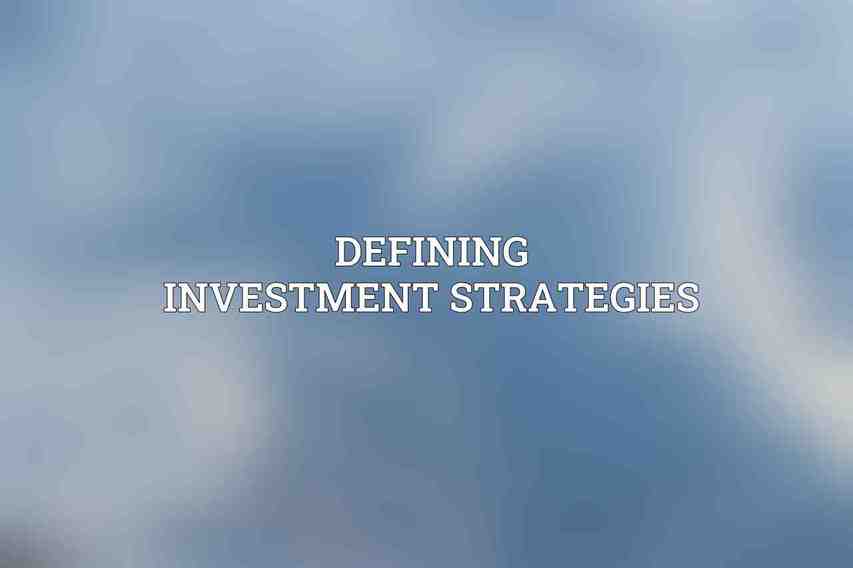Investing in this dynamic financial world requires a deep understanding of smart investment strategies. Investment strategies are tailored approaches that investors use to allocate their funds in various financial assets with the intention of generating profitable returns over time. The benefits of smart investing are abundant and can lead to long-term wealth building, financial security, and the achievement of one’s financial goals. These strategies can be categorized into different types, including growth strategies, income strategies, and balanced strategies.
Defining Investment Strategies

Investment strategies encompass a range of methodologies that guide individuals on where and how to invest their money. These strategies take into account factors such as risk tolerance, financial goals, and market conditions to optimize returns while managing risks effectively.
Benefits of Smart Investing

- Long-term Wealth Building: By strategically investing your savings, you have the potential to grow your wealth over time through compounding returns and capital appreciation.
- Financial Security: Investing prudently can create a safety net for unforeseen circumstances and provide a source of income in retirement.
- Achieving Financial Goals: Whether it’s buying a home, funding education, or retiring comfortably, smart investment strategies can help you reach your financial milestones.
Investment Options for Savers
When considering investment options to grow your savings, there are several avenues to explore, each with its own set of benefits and risks. Bonds, stocks, mutual funds, and exchange-traded funds (ETFs) are popular choices among investors looking to diversify their portfolios and maximize returns.
Bonds
Bonds, essentially loans made by investors to governments or corporations, offer a fixed rate of interest over a specified period. They are considered less risky than stocks and can provide a steady income stream for investors.
Definition and Types of Bonds
There are various types of bonds, including government bonds, corporate bonds, and municipal bonds, each with its own risk profile and yield potential.
Stocks
Stocks, or shares of ownership in a company, represent a stake in the company’s assets and earnings. Investing in stocks can lead to capital appreciation and dividends but comes with higher volatility compared to bonds. Read more about this on Saving Money for Beginners: A Step-by-Step Guide Read more on High-Interest Savings Accounts: 2024’s Top Picks
How to Choose Stocks for Your Portfolio
Selecting stocks involves researching companies, analyzing financial statements, and considering factors such as industry trends, growth potential, and valuation metrics to make informed investment decisions.
Building an Investment Portfolio
Building a well-balanced investment portfolio is crucial for long-term financial success. Asset allocation, rebalancing strategies, and tax-efficient investing are key components to consider when constructing and managing your investment portfolio.
Asset Allocation
Asset allocation involves spreading your investments across different asset classes to reduce risk and optimize returns. Diversification is essential for mitigating the impact of market fluctuations on your portfolio’s performance.
Importance of Diversifying Your Portfolio
Diversification helps spread risk by investing in assets that do not move in tandem with each other, thus cushioning the impact of volatility in specific sectors or markets.
Rebalancing Your Portfolio
Regularly rebalancing your portfolio ensures that your asset allocation remains aligned with your investment goals and risk tolerance. This involves adjusting the weights of various assets to maintain the desired risk-return profile.
Long-Term Considerations
As an investor, understanding compound interest, inflation, investment psychology, and the importance of regular monitoring are critical for long-term financial planning and wealth accumulation.
Compound Interest and the Power of Time
Albert Einstein famously referred to compound interest as the “eighth wonder of the world.” The concept underscores the exponential growth of money over time when reinvested, highlighting the significance of starting early and staying invested. Check this blog on How to Reduce Household Expenses: Tips and Strategies
Inflation and Its Impact on Investments
Inflation erodes the purchasing power of money over time, emphasizing the need for investments to outpace inflation to preserve and grow wealth effectively.
Getting Started with Investing
Embarking on your investment journey involves setting clear investment goals, conducting thorough research on potential investments, and considering the option of working with a financial advisor for personalized guidance and expertise.
Setting Realistic Investment Goals
Establishing achievable investment goals helps create a roadmap for your financial future, outlining milestones and timelines to track progress and make informed decisions.
Researching and Understanding Investments
Before investing, it’s crucial to research and understand the different investment options available, considering factors such as risk, return potential, liquidity, and alignment with your overall investment strategy.
implementing sound investment strategies, diversifying your portfolio across various asset classes, and staying informed about market trends are key elements in growing your savings and achieving your financial objectives. By staying disciplined, adapting to changing market conditions, and seeking professional advice when needed, you can navigate the complexities of investing and work towards a secure financial future.
Frequently Asked Questions
What are some common investment strategies to grow your savings?
Some common investment strategies include diversifying your portfolio, investing in low-cost index funds or ETFs, regularly contributing to your accounts, and staying informed about the market trends.
How can I determine which investment strategy is best for me?
It is advisable to consult with a financial advisor who can assess your risk tolerance, financial goals, and time horizon to help you determine the best investment strategy for you.
Is it possible to grow savings through passive investments?
Yes, passive investments like index funds, mutual funds, and ETFs can help grow your savings over time with little effort required on your end. These investments often provide diversification and lower fees compared to actively-managed funds.
What role does risk play in investment strategies?
Risk is a critical component of investment strategies, as different investment options carry varying levels of risk. It is important to balance your risk tolerance with your investment goals to create a suitable strategy.
How can I stay informed about the market trends and make informed investment decisions?
To stay informed about market trends, you can follow financial news, read reputable sources, subscribe to investment newsletters, and regularly review your portfolio performance. Additionally, staying in touch with a financial advisor can provide valuable insights for making informed investment decisions.

